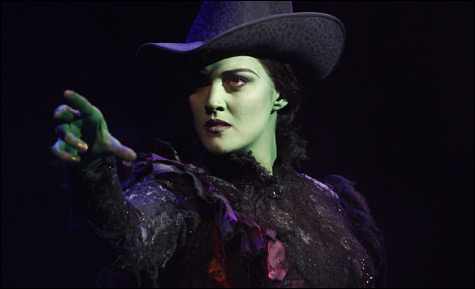
WICKED: Even wickeder the second time around? |
WICKED is a very different witch hunt from the 1995 Gregory Maguire novel on which it is based — one having less to do with the accidental evolution of evil than with girl bonding and spectacle. And on first viewing, under the just-cast spell of the book, I failed to give it its due. Yes, the production, which has just returned to the Opera House (through November 11), bearing its proscenium-spanning red-eyed dragon and 200 tons of dry ice, is strident, sentimental, and certainly showy. And too much of Stephen Schwartz’s score seems ready for the barricades. But the lyrics of the lighter-weight numbers are clever, and My So-Called Life creator Winnie Holzman’s tongue-in-cheek book, if it lacks the depth and imagination of Maguire’s, is full of snappy jokes and Ozian allusions. The phenomenal success of the musical, which remains Broadway’s highest-grossing four years into its run, may have more to do with its heavy-handed smoke and morals than with the winking insouciance built into Holzman’s book and Joe Mantello’s production. Yet there is something here for everyone, as long as everyone is not looking for the Rowling-esque genius of Maguire any more than he or she did the weight of Victor Hugo in Les Misérables.
The end is the beginning in Wicked, which starts with general Munchkin jubilation over the death of the Wicked Witch of the West, her looming green form seen breaking up behind a scrim. Glinda the Good then floats in amid an aureole of soap bubbles, in an intricately wrought golden circle that at once recalls her means of transportation in the iconic 1939 film The Wizard of Oz and fits Tony winner Eugene Lee’s brilliant set design, which nestles the whole mega-musical inside Maguire’s prophetical Clock of the Time Dragon, its huge gears rolling on and off like, well, clockworks.
The show then flashes back to Maguire’s ingenious prequel to L. Frank Baum’s tale of Dorothy’s odyssey to Oz, the tale of two disparate, ambitious young women who wind up on opposite sides of the law. Elphaba (an abbreviation of L. Frank Baum) has the social disadvantage of being born the color of Kermit, whereas blonde Galinda has all the perks, as well as the apparent shallowness, of pre-jail Paris Hilton. Roommates at Shiz University, the two overcome an initial mutual loathing to become girlfriends — before they fall out over a guy and the fiercely idealistic Elphaba, enraged by growing animal repression in Oz, explodes into a PETA-worthy activist who thumbs her nose at a Wizard who’s part Mr. Cellophane and part Hitler.
Another reason the Wicked returning to the Opera House is more fun than the one that first touched down there is the delightful Christina DeCicco, a pert Carole Lombard of a Galinda with a soaring soprano and a self-congratulatory enthusiasm that manifests itself in something like restless-leg syndrome. Victoria Matlock’s Elphaba is aptly awkward, acerb, and, once she strides her broom to fly into a collision of crossbeams in the stormy “Defying Gravity,” empowered. She sometimes pushes her voice to the point of unpleasantness, but she is a witch. As Fiyero, the dilettante prince turned Elphaba’s rebel lover, bland Cliffton Hall, though he sings well enough, hardly seems a chap Paris H. and Hermione Granger would fight over.